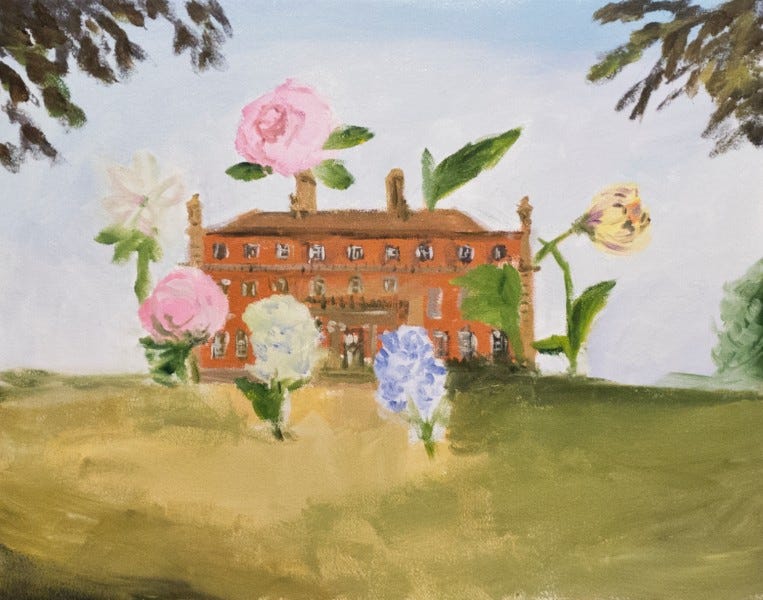communication on all levels
Hi! I’m doing a 10% off sale to celebrate one year of paid subscriptions. Most of my posts are paywalled now, so if you enjoy this Substack please consider subscribing! Thanks v much.
Karen Kilimnik, The Summer House, 2011
I’ve been thinking about this tweet since I first saw it. When I examine my current and past relationships, it really does come down to this: all the good things are about the ability to communicate. All the bad things come down to the inability to bridge the gaps between us.
Two communication failures from my past: 1) I once had an ex who was more traditional and closed-off. I, as you might have gathered, am very open and explorative. That difference wasn’t a dealbreaker in and of itself, but when we had conflicts about it I always felt like we talked past each other. We were fundamentally speaking different languages. Neither of us could translate for the other. We were never able to argue in a way that led to a resolution: we simply gave up at some point, our minds unchanged. 2) I dated a guy for a while who was really afraid of me writing about him. (As you know, I like to write about my life). This also wasn’t a problem on its own, but when I tried to have a conversation about it (Would you ever be okay with me writing about you in an anonymized form?) he said, I can’t believe you would push me on this. You’re so immature. I knew then and there that I could never be with someone who could talk to me in that way: dismissive, judgmental, uninterested in understanding.
But all the best moments have also been about communication. Physical chemistry is a form of communication (sex as a way through the self, to the self). Mental chemistry too: I told someone I loved recently that I loved them because I was interested in all the places their mind could go—because those were the places that my mind also went. My friend said that when she first fell in love with her boyfriend there were three weeks they were late for work every single day because they would stay up until 6 AM talking, talking, talking in bed. My earliest definition of love was the euphoria of understanding and being understood, of your solitude cracking wide open.
I think I’ve become a much better communicator over time, though I still have a long way to go. Isn’t that how it always is—the better you get, the more you see how you can improve? I spent so many years refusing to dig deeper because I was afraid I would freak someone out, afraid they would be scared away by my honesty. When I think back on that it makes me want to cry. Because I’ve lost so much time. Here’s what I know: I’ve never regretting asking, never regretted knowing more. Asking only accelerates the already-present ground truth of the relationship—either you two will be able to accept each other, or you won’t and it was always doomed. You might think that presenting the truth in a pretty way will change the outcome, but it won’t.
I believe that when you love someone you should want to know them completely. When you refuse to ask questions, you’re choosing to not to know. It’s so sad to choose to turn away from the actual reality of someone you care about. Paraphrased from Drive My Car: I can handle the truth, no matter what it is. Not knowing is what’s scary.
Once I said to a boy: When I try to talk to you, when I ask for more explanations, I’m being utopian. Because I’m expressing my faith in the possibility that we could understand each other completely. And it’s so very hard to understand someone completely. I wouldn’t claim I’ve gotten there with anyone. But it’s the dream. I told my psychoanalyst that I often think about what Joan Didion wrote about her husband in The Year of Magical Thinking: I could not count the times during the average day when something would come up that I needed to tell him. This impulse did not end with his death. What ended was the possibility of his response. She goes on to quote C.S. Lewis:
“I think I am beginning to understand why grief feels like suspense,” C. S. Lewis wrote after the death of his wife. “It comes from the frustration of so many impulses that had become habitual. Thought after thought, feeling after feeling, action after action, had H. for their object. Now their target is gone. I keep on through habit fitting an arrow to the string, then I remember and have to lay the bow down. So many roads lead thought to H. I set out on one of them. But now there’s an impassable frontierpost across it. So many roads once; now so many cul de sacs.”
That’s love, right? So many roads of thought lead to you. Having them makes me feel less lonely.
I also do an advice column! If you have questions, please feel free to ask me them here.




Thank you. Such a good observation and much needed.
'Here’s what I know: I’ve never regretting asking, never regretted knowing more.' Thank you for this evergreen reminder.